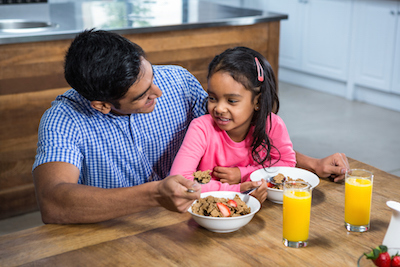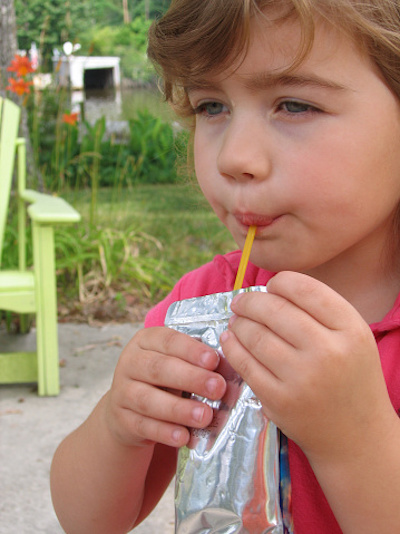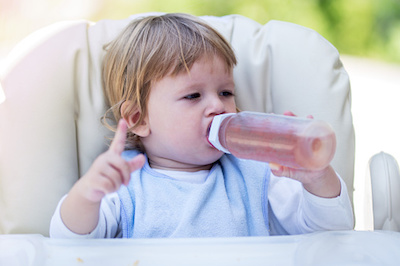Why your pediatrician isn't a big fan of fruit juice
You may have seen some recent news headlines that state that pediatricians recommend that infants less than one year of age consume no fruit juice at all. While this is a change to previous recommendations stating that juice was not recommended in infants less than six months of age, the truth is that pediatricians have long been wary of kids drinking too much fruit juice. Even among older kids, the recommended serving sizes of juice they can consume in a day are shockingly small.

But didn’t we grow up thinking that fruit juice was really good for you? And what about all those people who fire up their juicer every morning for a healthy liquid breakfast? Isn’t juice a lot better for our kids than a bunch of the other things they could be drinking?
If these are some of the questions that you’ve asked yourself lately, you’re not alone so let’s talk about some of the main reasons you should limit the amount of fruit juice available to your kids.
Nutritional benefits are often overstated
We give our kids juice because we think it’s good for them. However, an infant under the age of 1 year receives no added nutritional benefit from drinking juice. Before six months of age, they should get all of their nutrition from either breast milk or formula, and after six months of age they gradually consume more solid foods along with breast milk or formula and have no need of juice. Offering juice to an infant can mean that they drink the sugary liquid in place of formula or breast milk, which can result in nutritional deficiencies.
 For older kids, small amounts of fruit juice are okay, but they are not the nutritional powerhouse you might think they are. It’s true that we want to encourage our kids to eat a diet rich in fruits and vegetables. But it’s important that you understand that eating whole fruit and consuming fruit juice are not nutritionally the same thing. Whole fruit, besides important vitamins and minerals, also offers a significant source of fiber, and fiber is important for gastrointestinal health as well as creating that feeling of fullness to tell us when to stop eating. The problem with fruit juice is that it allows quick consumption of a lot of sugar, and none of the fiber to tell us when enough is enough.
For older kids, small amounts of fruit juice are okay, but they are not the nutritional powerhouse you might think they are. It’s true that we want to encourage our kids to eat a diet rich in fruits and vegetables. But it’s important that you understand that eating whole fruit and consuming fruit juice are not nutritionally the same thing. Whole fruit, besides important vitamins and minerals, also offers a significant source of fiber, and fiber is important for gastrointestinal health as well as creating that feeling of fullness to tell us when to stop eating. The problem with fruit juice is that it allows quick consumption of a lot of sugar, and none of the fiber to tell us when enough is enough.
While juice does give us vitamins and minerals, pediatricians will often tell you that it would be better if those vitamins and minerals were consumed by eating the fruit instead of drinking the juice.
Dental health is a concern
Drinking fruit juice can result in the formation of cavities. Along with concentrated amounts of sugar, juice also contains acids that can damage tooth enamel. Both pediatricians and pediatric dentists recommend that if you do give toddlers juice, you should give it in a cup, not a bottle. They may be offered a small amount of juice at a meal or snacktime, but they shouldn’t carry juice around in a bottle or sippy cup to drink all throughout the day. This results in sugar sitting on their teeth for a prolonged period of time, which can lead to cavities and poor dental health.
May contribute to obesity
Fruit juice is easily over-consumed by adults and kids alike. Why? Because it just tastes good. Drinking excessive amounts of juice can cause children to consume more calories per day than is healthy for them, potentially leading to weight gain over time. While the vitamins and minerals contained in fruit juice is healthy, excessive weight gain can be harmful and may contribute to obesity later on. Again, it’s much better to get these vitamins and minerals from the whole fruit rather than the juice. If you aren’t sure how much juice your child should be drinking each day, here’s a quick reminder:

Toddlers age 1 to 3 years: Less than 4 ounces per day
Children age 4 to 6 years: 4 to 6 ounces per day
Children age 7 to 18 years: 8 ounces per day
As you can see, these recommended daily amounts of juice are pretty small. Water and low-fat milk are the best go-to drinks for kids to have routinely, and you may want to think of everything else (including juice) as a special treat that they get on occasion.







